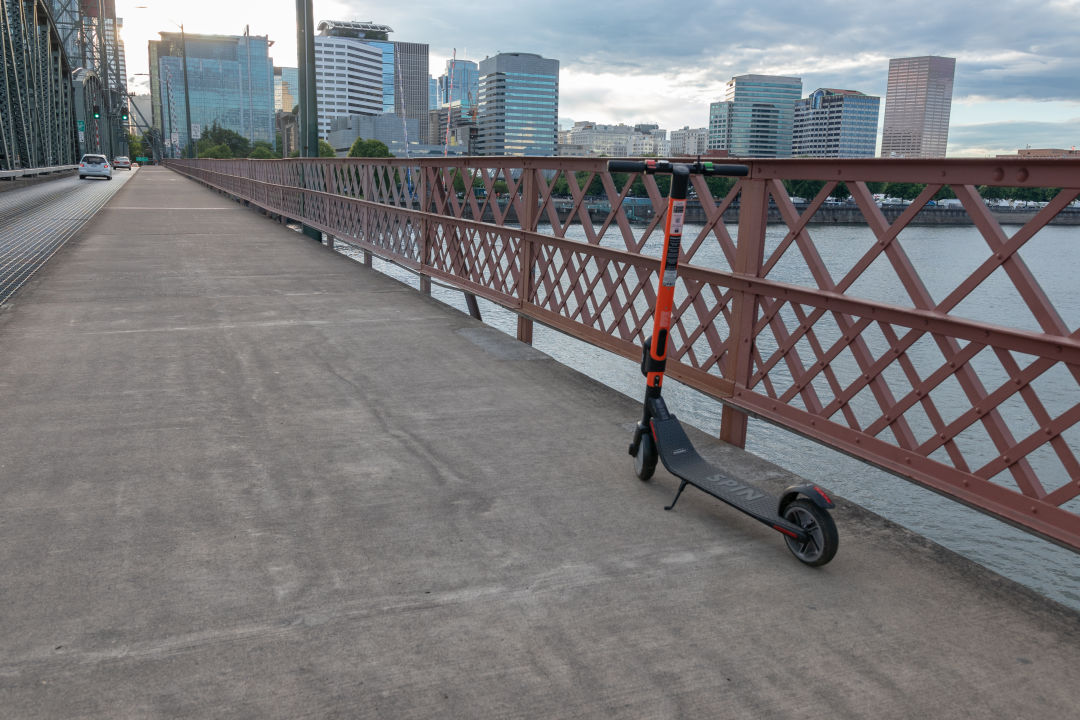More E-Scooters Are Returning to Portland’s Streets. But Will People Ride Them?

Image: Tony Prato/Shutterstock
One sign that the Portland metro area is tiptoeing toward loosening some of the stringent stay-at-home regulations: scooters are reappearing on city streets in greater numbers.
Backers say they’re hoping that the pandemic-induced pause—scooter traffic shriveled to virtually nothing during late March and early April, per data from the Portland Bureau of Transportation—will be a chance for a fresh start for scooters in the city, which have, at times, had a bumpy ride.
On the one hand, scooters and their ride-sharing brethren, the orange bike fleet maintained by Biketown, are pretty ideal for social distancing. You’re outside, it’s just you, and it’s faster than yet another walk.
On the other hand, the idea of gripping onto handlebars that another rider has recently been hanging onto feels not a little bit peculiar for those who’ve been scrupulously keeping their distance from the rest of humanity for weeks. (Of note: coronavirus is most often spread via tiny droplets that we cough or sneeze out. If said droplets fall on a surface that we touch and then touch our face, the infection can spread, though the Centers for Disease Control says that’s not the main source of transmission.)
Maurice Henderson, director of government relations at Santa Monica-based Bird, which has about 200 scooters on the streets in Portland right now, says sanitization practices have been stepped up, and that 13 high-touch contact points on the company’s fleet—including the neck, the bell, and the throttle—are getting washed “several” times a day, though not necessarily after each individual rider.
“In the cities where we have re-engaged, we are providing a service for those essential trips that need to be taken,” says Henderson, a former chief of staff to Portland Mayor Ted Wheeler and chief operating officer at Tri-Met who now lives in Bend.
The pandemic has not been particularly kind to the e-scooter industry overall. Most of the major players, including Lime and Bird, have reported lay-offs and pulled much of their fleet off of city streets.
Still, there are encouraging signs for the industry: cities from Portland to Paris have been closing streets to all but neighborhood traffic to make more room for cyclists, joggers, pedestrians and, yes, scooter users. Some are going further: cities across Germany are erecting hundreds of miles of pop-up bicycle/e-scooter lanes in anticipation of people shying away from buses and subways for months on end.
Portland has taken a firmer hand in partnering with the various players in the e-scooter market from the beginning, as opposed to the pop-up, ask-forgiveness-not-permission model in other cities. During the height of the pandemic, the city’s transportation bureau partnered up with e-scooter company Spin to waive daily fees in exchange for a consumer price chop of 50 percent per ride. Spin and Bird have also both offered free rides to medical and emergency response professionals.
In an April article for CityLab, transportation analysts David Zipper and Marla Westervelt suggested that cities should be prepared to subsidize e-scooters and bike shares, to help fill in the gaps long-term if commuters continue to shy away from mass transit. That’s a tough ask in Portland, though, where the city council on Friday signed off on a budget that was $75 million below target, due to the drop in revenue from the coronavirus fallout.
Meanwhile, data shows that after bottoming out at just 1,425 total e-scooter trips citywide between March 30 and April 5, usage has slowly rebounded, though it’s still well below normal. Between May 11 and May 17, PBOT’s data shows that there were 7,339 e-scooter rides across the city.
If you’re one of those, know that you’re contributing to science: researchers at Portland State and the University of Tennessee at Knoxville are teaming up to study the effects of the pandemic commuters over the coming months, to see if more people do turn to bike shares and e-scooters.




